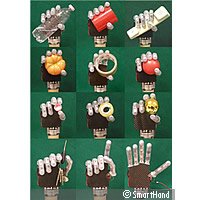Oct 9 2009
Pioneering techniques in the manufacture of artificial limbs continue to emerge in Europe, and the SMARTHAND ('The smart bio-adaptive hand prosthesis') project has risen to the challenge. Funded under the 'Nanotechnologies and nano-sciences, knowledge-based multifunctional materials and new production processes and devices (NMP)' Thematic area of the EU's Sixth Framework Programme (FP6), SMARTHAND has combined cutting-edge research from various technologies with cognitive neuroscience. The result, an artificial hand with the basic features of a real human hand, will help amputees to regain sensation. Funding for SMARTHAND totals EUR 1.8 million.

What is unique about the sophisticated prototype artificial hand developed by the SMARTHAND partners is that not only does it replicate the movements of a real hand, but it also gives the user sensations of touch and feeling. The researchers said the hand has 4 electric motors and 40 sensors that are activated when pressed against an object. These sensors stimulate the arm's nerves to activate a part in the brain that enables patients to feel the objects.
Robin af Ekenstam, an amputee from Sweden, was astounded by the result. An aggressive tumour discovered on his right wrist forced Mr af Ekenstam to amputate his limb in order to save his life and stop the cancer from spreading to the rest of his body. He currently wears an electronic hook, but the problem with this device is that he cannot feel what the hook does and handling is at a minimum.
'I am using muscles which I haven't used for years,' television news channel euronews quoted Mr af Ekenstam, the first amputee to try the hand, as saying. 'That is very hard. But if you are able to control a movement, it is great. It is a feeling that I have not had for a long time. And now I am also getting the sensation back from small motors, which put pressure on certain spots on my hand,' he said. 'When I grab something hard, then I can feel it in the fingertips, which is strange, as I don't have them anymore. It's amazing.'
Led by Sweden's Lund University, the researchers continue to work on the sensory feedback system within the robotic hand. The hurdle they need to cross is to make the cables and electric motors smaller. Nanotechnology could help the team iron out any problems. Specifically, they would implant a tiny processing unit, a power source and a trans-skin communication method into the user of the hand to optimise functionality.
Dr Göran Lundborg, an expert on how the brain controls hand movements, told euronews: 'We know that by placing pressure sensors on the fingers of the artificial hand, we can transpose that pressure signal to specific areas in the skin of the remaining hand.
'And if you find the right spots to stimulate, we know that also the correct areas of the brain cortex will be activated. In other words, if you put pressure on the index finger of the artificial hand, the index finger area of your brain will be activated.'
Professor Fredrik Sebelius of the Department of Electrical Measurements at Lund University said, 'The neural interface of the future could be implanted inside the arm which could then be connected to the peripheral interface.'
Professor Sebelius, who is also co-coordinator of SMARTHAND, added: 'The internal interface could then receive and measure signals coming directly from the brain, and at the same time send sensory signals to the brain. It would transmit the signals as radio waves to the external prosthesis which would then be controlled and register sensation.'
SMARTHAND partners are ARTS Lab, Scuola Superiore Sant'Anna (Italy), Aalborg University (Denmark), Tel Aviv University (Israel), Tyndall Institute (Ireland), Ossur (Iceland) and SciTech Link HB (Sweden).
Source: Cordis